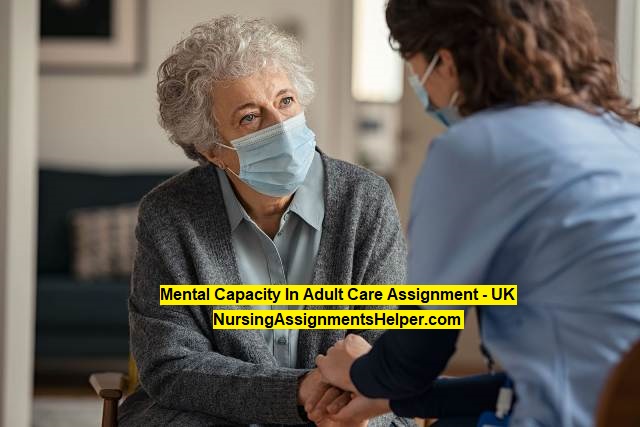DILMAC19 Mental Capacity In Adult Care
The knowledge and understanding in relation to mental capacity in adult care. Understand the provisions of the Mental Capacity Act in relation to adult care Understand how to work with decision makers Understand how to work with individuals who lack capacity
DILMAC19 Mental Capacity In Adult Care.

Learner Instructions : From today and look at the links provided to support your learning
WWW.XXX.COM
Please answer the following questions and submit by:
Outcome 1:
Understand the provisions of the Mental Capacity Act in relation to adult care
1.1 Summarise current legislation, regulation, and codes of practice in relation to mental capacity.
To include:
Mental Capacity Act (MCA) (2005)
Mental Capacity Act code of practice
Care Act (2014) – principles in relation to capacity and advocacy
Advocacy Code of Practice (2014) Deprivation of Liberty Safeguards (DoLS) (2009)
Deprivation of Liberty Safeguards code of practice to supplement the Mental Capacity Act code of practice
Equality Act (2010)
two-stage test (functional test)
five guiding principles.
DILMAC19 Mental Capacity In Adult Care
1.2 Discuss the principles of deprivation of liberty in context of own role.
To include:
HL v United Kingdom (Bournewood judgement)
Article 5 of the European Convention of Human Rights
The difference between deprivation and restriction upon liberty
Standard and urgent authorisation
Referral process to supervisory body
Supreme Court ruling on ‘Cheshire West’ – subsequent acid test.
Outcome 2:
Understand how to work with decision makers
2.1Evaluate the roles and responsibilities of an independent mental capacity advocate (IMCA) in the context of own role.
To include:
Advocacy service standards and codes of practice
Limits and boundaries of independent advocacy
Rights and powers of an independent mental capacity advocate (IMCA)
instructed and non-instructed advocacy
Referral process.
DILMAC19 Mental Capacity In Adult Care
2.2 Explain best interest decisions under the Mental Capacity Act (2005).
To include:
Decision maker and the decision required
Best interest principles
Timely decision-making
Regular reviewing – consider fluctuating capacity
Views of the individual central to all decision-making (self-advocacy)
Consider who to involve in decision-making – carers, family, friends, professionals.
DILMAC19 Mental Capacity In Adult Care
Outcome 3:
Understand how to work with individuals who lack capacity
3.1 Reflect on processes applied in own service when working with individuals who lack capacity.
To include:
Views and wishes of the individual are paramount
What is the decision to be made
Consider particular needs including communication, mobility, cultural needs
Range of communication methods
Principles of liberty and autonomy
Person-centred models, involvement and care planning
Awareness of safeguarding matters – consider duress
Unwise decisions (principle of Mental Capacity Act 2005)
Proactive risk-taking (awareness of paternalism)
Respect other people’s ideas, values and principles
Consider advanced decisions
Evidence-based practice.

3.2 Evaluate how own service ensures safety and well-being of individuals who lack capacity within adult protection.
To include:
Safeguarding policies
Safeguarding referrals and timescales
Serious Case Reviews
Multi agency working
Risk management and protection (safety) plans
Statutory requirements for record keeping and sharing information (confidentiality)
Role of the Court of Protection
Role of the Office of the Public Guardian
Power of attorney (‘property and affairs’ and ‘personal welfare’) and deputyship
DILMAC19 Mental Capacity In Adult Care